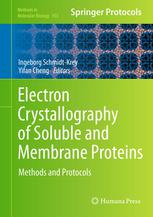

Most ebook files are in PDF format, so you can easily read them using various software such as Foxit Reader or directly on the Google Chrome browser.
Some ebook files are released by publishers in other formats such as .awz, .mobi, .epub, .fb2, etc. You may need to install specific software to read these formats on mobile/PC, such as Calibre.
Please read the tutorial at this link. https://ebooknice.com/page/post?id=faq
We offer FREE conversion to the popular formats you request; however, this may take some time. Therefore, right after payment, please email us, and we will try to provide the service as quickly as possible.
For some exceptional file formats or broken links (if any), please refrain from opening any disputes. Instead, email us first, and we will try to assist within a maximum of 6 hours.
EbookNice Team

Status:
Available5.0
34 reviewsThe basic principle of electron crystallography is to calculate a 3D density map by combining the amplitudes obtained from electron diffraction patterns with the experimental phases calculated from images of two-dimensional crystals of membrane or soluble proteins. This technology is very well developed and has produced a number of atomic models of membrane proteins in a lipid environment. Focused on comprehensive experimental protocols, Electron Crystallography of Soluble and Membrane Proteins: Methods and Protocols covers the entire range of techniques used in electron crystallography, including protein sample preparation, 2D crystallization, and screening in negative stain over electron cryo-microscopy (cryo-EM) and data processing, as well as modeling of conformational changes. Additional chapters provide perspective on past, present, and future challenges as well as complementary methods. Written for the popular Methods in Molecular Biology™ series, the work contains the kind of detailed descriptions and implementation advice necessary to ensure successful results.
Comprehensive and cutting-edge, Electron Crystallography of Soluble and Membrane Proteins: Methods and Protocols serves laboratories new to the methods as well as state-of-the-art facilities pursuing this exciting area of protein science.